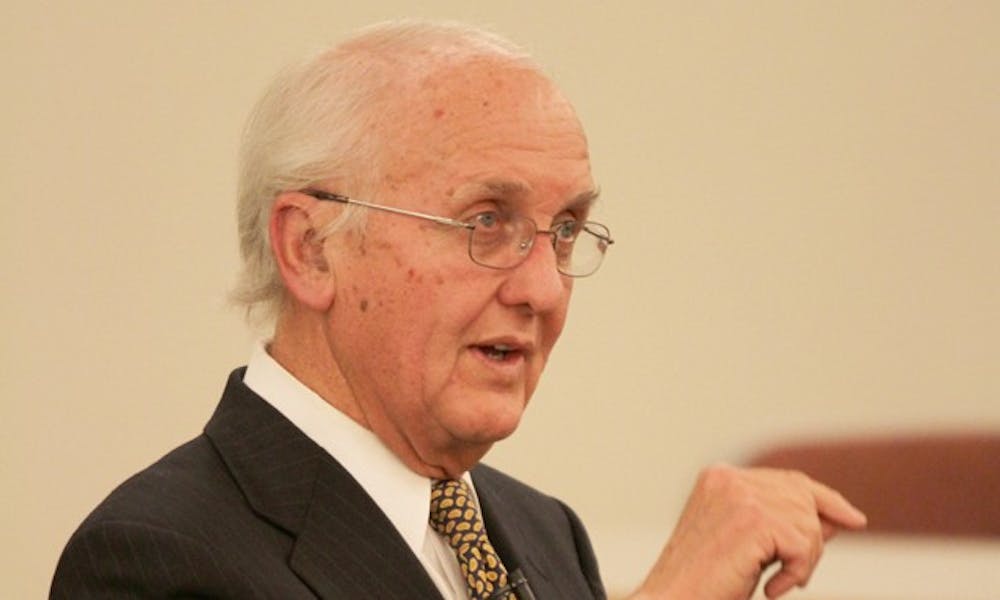The United States needs to put more emphasis on economic engagement in order to enhance its relationship with India, a former Clinton administration official said.
Raymond Vickery, Trinity ’64 and assistant secretary of commerce during the Clinton administration, told students and faculty in a lecture Thursday that though U.S. politicians and diplomats tend to focus on military and political relationships with India, economic undertakings are the most effective facilitators of increased interaction between the two nations.
“There is a bias in favor of political affairs, which overshadows anything else,” Vickery said. “Now it’s time to shift attention to economic engagement. Trade and investment cannot directly better the international relationship, but they are the engine for countries to cooperate strategically.”
Vickery has 55 years of experience as a diplomat interacting with India, working on issues that range from civil nuclear facilities, environmental protection, film privacy to medical care. His diverse experiences have made Vickery aware of the centrality of economic endeavors with regard to an improved relationship with India.
“Our strategy should be centered at economic engagement,” he said. “If not, we would lose the primary driver of cooperation [with India].”
Anirudh Krishna, professor of public policy and political science and associate dean for international academic programs, introduced Vickery in the Sanford School of Public Policy and described him as a thoughtful yet optimistic expert on the U.S.-India relationship. Krishna said Vickery’s rich experience made his arguments especially valuable.
“With his insider knowledge, long-standing engagement and intimacy with key players, he will inform us about significant emerging trends and opportunities.” Krishna wrote in an email preceding the lecture.
Vickery suggested that economic engagement between the U.S. and India include more than just trade and investment occurring at more than the government level. Instead, ties unfolded in all economic sectors.
Historically, trade interactions have been improving between the U.S. and India, Vickery said, noting that the phenomenon has resulted in the United States’ technological aid toward India, with India providing manufactured goods for sale in the U.S. This type of reciprocal economy is a significant outgrowth of improved diplomatic relations, especially after the Indian economic crisis in 1991 when America and India turned from “estranged to cooperative” toward each other.
Since then, India has become an active participant in the global economy. The developing nation was one of the 135 founding members of the World Trade Organization and has launched initiatives to promote the economic relationship between it and the U.S. India has also emerged as a burgeoning market for America, which has improved diplomatic relations.
Junior Gautam Joseph, who was in attendance Thursday, agreed that economic engagement has become an important consideration for the U.S.-India relationship.
“It is the economic engagement that has been pushing [the US-India relationship] forward,” Joesph said.
Another change in the United States’ strategy with India is in its nuclear cooperation. India was once one of the most active countries in expanding the nuclear weapon scheme. Vickery said that this is due to the deficit of trust between India and the western world.
“What happened was that the Bush administration first endorsed cooperation in high technology among various segments including many private enterprises,” Vickery said. “Based on that, there was strategic partnership.”
Strategic partnership in nuclear corporate relations peaked with the U.S.-India Civic Nuclear Agreement signed in 2005, he said.
The economic collaboration that was fostered by the Bush administration has also left a profound global legacy, Vickery noted.
“The Indian people have a better view of the U.S. than any other country in the world,” he said. “The Bush administration was twice as popular in India as in [the U.S.].”
Vickery also noted that although economics is one of the key factors of this transnational relationship, economic engagement is not the whole answer to effective diplomatic relations.
“The message is that you’d better look at economic engagements and other aspects as in the same system,” Vickery said. “An integrated approach should be developed.”
John Boler, Fuqua ’00, said he found that Vickery’s argument not only fits the model of the U.S.-India relationship but can also be extended to explain relationships with other countries.
“It is always necessary to note the significant role that economic engagement plays when dealing with international relationships,” Boler said. “There is definitely an analog between India and other booming economies such as China.”
Get The Chronicle straight to your inbox
Signup for our weekly newsletter. Cancel at any time.

